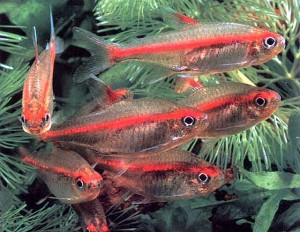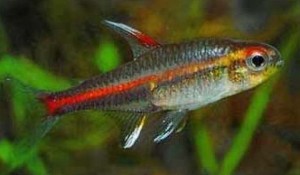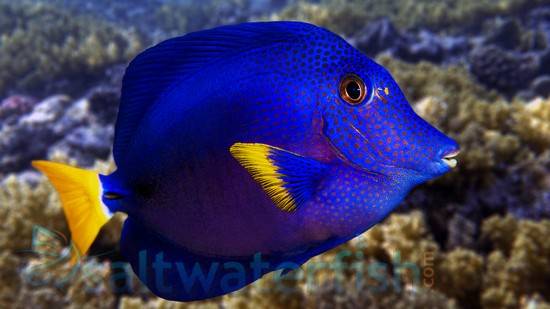The Glowlight Tetra (Hemigrammus erythrozonus) is a peaceful shoaling species that comes from the clear water streams and the Essequibo River in Guyana, South America.
Glowlight Tetras have a clear body with a bright iridescent neon red to orange stripe that extends from the snout of the fish to the base of its tail. The front of the dorsal fin is the same color as the stripe, and the other fins are silver to transparent in color. Golden and albino varieties are also sold. Like most tetras, the females are larger and more fat bodied than the more slender males. They are easier to sex when fully mature and the females are ripe with eggs.
Tropical fish keeping enthusiasts occasionally confuse the Red Line Rasbora (Rasbora pauciperforata) of Malaysia and Indonesia (which has similar colors and markings) with the Glowlight Tetra however, it is in the Cyprinidae family and not a close relative.
Glowlight Tetras “glow” like a lamp under dim aquarium lighting, hence their common name. They are popular, readily available to tropical fish keeping enthusiasts, and are usually inexpensive.
Hemigrammus erythrozonus are a hardy, peaceful species that are best viewed in the aquarium when kept under subdued lighting with a dark substrate. Health wise and aesthetically they do best in groups of odd numbered (9 or more) individuals and make a great addition to any soft water community aquarium with fish of the same size.
Glowlight Tetras should be housed in a densely planted tank with a dark sandy or fine gravel substrate, some rocks, and driftwood to mimic their natural habitat. They prefer soft to slightly hard; d°GH of 6° to 15°, slightly acidic; pH of 6.8, water with a temperature range of 72° – 82 °F but they easily adapt to harder water conditions.
In an aquarium environment, Glowlight Tetras are moderately difficult to breed. First set up a 40 gallon breeding tank with soft water (8°dGH), a carbonate hardness of less than 2°dCH, and a water temperature between 78 °F and 82 °F. Because Glowlight Tetras are egg scatterers, they should be provided with fine leaved plants like Java Moss (Taxiphyllum barbieri) or Fontinalis, or a spawning mop for them to deposit their eggs on.
Select a pair and condition them with a variety of live, frozen or dry foods for a couple of weeks. When the female is rounded out, transfer the pair to the unlit breeding tank during the late afternoon hours. Keep the tank dark overnight and spawning will usually occur the following morning or the next day. The male will swim around and lock his fins when near the female. During spawning, both fish roll over and when the female is in the upside down position, she ejects the eggs as the male fertilises them. Anywhere from 120-150 eggs are scattered on the plants and on the bottom of the tank. When spawning is complete, the pair will start grazing on the eggs and should be immediately removed from the breeding tank.
The eggs are light sensitive, so keep the breeding tank as dark as possible. Adding a peat bag to the tank helps to reduce fungal infections on the eggs. The fry will resemble small slivers of glass when they hatch out in 20 to 30 hours.
After their egg sacs have been absorbed, feed the tiny fry infusoria, paramecium culture, rotifers, and crushed flakes. As they grow larger around the fourth or fifth day, off them a small portion of newly hatched brine shrimp and as they increase in size, .
In the wild Hemigrammus erythrozonus are omnivores that primarily eat insect larvae. In an aquarium environment they will eat small live, frozen, freeze dried, and flake foods. Brine shrimp, freeze dried bloodworms, tubifex and daphnia
are all eagerly accepted but vary their diet with occasional offerings of vegetable matter.
Glowlight Tetras are usually 1/2″ to 1-1/4″ long when available for purchase.
Minimum Tank Size: 15 gallons
Care Level: Easy
Temperament: Peaceful
Aquarium Hardiness: Hardy
Water Conditions: 72-77° F, KH 4-8, pH 5.5-7.0
Max. Size: 2″
Color Form: Clear, Red
Diet: Omnivore
Compatibility: Peaceful, keep with other small tetras
Origin: Farm Raised, Essequibo River in Guyana
Family: Characidae
Lifespan: 2 – 4 years
Aquarist Experience Level: Beginner




